
- Index
- Certification
- Grade
- Place Of Origin
- Austria (7)
- Burma (until 1948) (13)
- Canada (50)
- China (18)
- Egypt (19)
- France & Colonies (10)
- Germany & Colonies (27)
- Great Britain (12)
- India (1947-now) (14)
- India (until 1947) (8)
- Ireland (6)
- Israel (28)
- Japan (37)
- New Zealand (7)
- Philippines (11)
- Qatar (7)
- Tristan Da Cunha (15)
- Ukraine (282)
- United States (401)
- Vatican (6)
- Other (698)
- Type
- Year
- Year Of Issue
ROBERT MONDAVI Autographed Inscribed First Day Cover CARD FDC
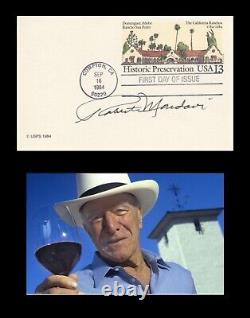
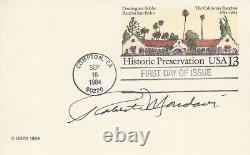
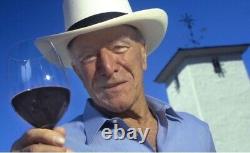
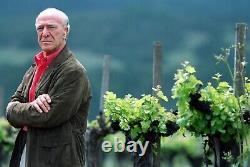
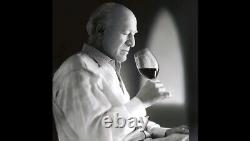
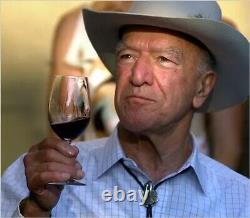
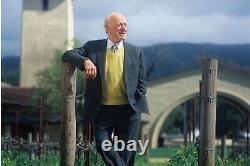
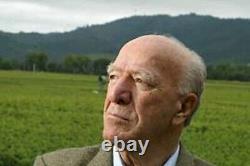


Signed "Robert Mondavi" in black ink. This is a First Day Cover CARD celebrating Historic Preservation. It has a First Day of Issue on September 16, 1984 in Compton, California.
Card is in FINE condition. Robert Gerald Mondavi was born on June 18, 1913, the third child of Cesare and Rosa Mondavi. A younger brother, Peter, arrived 14 months later.
The Mondavis had emigrated from the. To the iron-mining town of. In 1906, "to find work and a better life for themselves and their families, " Robert wrote in his 1998 memoir.Wine played a major role in the Mondavi household, "strong, homemade red wine, " Robert recalled. In 1919, the local Italian-American community selected Cesare to go to. The Volstead Act permitted people to make 200 gallons a year for family consumption. "Almost as soon as he arrived, he fell in love with the frontier state, " Robert wrote.
Cesare sent the grapes back to. Robert, on the advice of his father, who believed that the. Wine industry had a future following the 1933 repeal of Prohibition, plunged headfirst into learning viticulture and enology. In 1936 and found a job at the old Sunny St. Helena Winery, now the home of Merryvale.
Cesare later became a part owner. But it was in 1943 that the family's fortunes changed dramatically. "The Charles Krug Winery had fallen on hard times and was going to be put up for sale, " Robert recalled. But "for years I clashed with Peter over the quality of our wines, " Robert wrote. In one of the most notorious family feuds in American wine history, Robert quit Krug in 1965, and the next year launched, with his elder son R. Michael, the eponymously named winery that would make him the most famous winemaker in. And one of the best known in the world. The Robert Mondavi Winery's achievements, beyond being the iconographical winery of. Robert pioneered the use of the term "Fumé Blanc, " and worked to improve the quality of Cabernet Sauvignon. On a more cultural level, he more than anyone else argued for the quality of Napa Valley wine, educating a public that was initially skeptical, but that later came to embrace Napa Valley as among the world's greatest wine regions. In 1979, Robert started his. Jugs of "Bob Red" and "Bob White" were among the most popular wines of the early 1980s. Robert's younger son, Tim, also joined Robert Mondavi Winery, eventually becoming chief winemaker. Around the same time, Robert entered into an agreement with Baron Philippe de Rothschild, of Château Mouton Rothschild, to create Opus One Winery, in. Just across Highway 29 from Robert Mondavi Winery's famous arch and campanile. Later, Robert set up joint ventures with local partners in Europe, South America, and.Robert and his wife, Margrit, were the chief contributors to the. The city's leading performing arts venue, and were founders and major benefactors behind. S COPIA: The American Center for Wine, Food and the Arts, which opened in November 2001.
In the 1990s, the Mondavi empire began to unravel. The company went public, and seemed to succumb to the demands of shareholders to boost its stock price, which some believed led wine quality to decline.
The various wineries and brands seemed to have grown too quickly, and the family lost control of events. The individual Mondavi family members were now richer than ever, but it was inglorious end to a stunning success story.
Robert Mondavi will be remembered by those who worked with him with profound respect. When I make the wines, I always think about him, says Genevieve Janssens, the long-time director of winemaking at Robert Mondavi Winery. Robert leaves his two sons, Michael and Tim, a daughter, Marcia, and his wife, Margrit. "Wine is life, " he wrote on the dedication page of.Quoting the Roman poet, Petronius. Certainly, Robert Mondavi enriched the lives of countless wine lovers over the course of his long and remarkable career.
The photographs shown in the listing are for display purposes only and not included as part of the sale. This is one of the Best guarantees anywhere!
